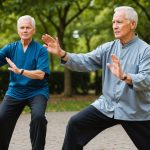In the realm of therapy and rehabilitation, a number of methods are adopted to assist patients in their recovery journey. One such method that has garnered attention recently is music therapy. A growing body of research, accessible through platforms like Google Scholar, Pubmed, and Crossref, suggests that music therapy can significantly impact the recovery of stroke patients. However, the extent of this impact remains a widely debated topic among researchers. This article aims to delve into this discussion, examining various studies and drawing on clinical evidence to answer the question: Can music therapy truly aid in stroke recovery?
The Theory Behind Music Therapy Post-Stroke
Music therapy, as the name suggests, involves the use of music in a therapeutic context. Numerous studies have been published, many of them accessible via Google Scholar and Pubmed, detailing the potential benefits of music therapy for stroke patients.
Also to see : Can Regular Yoga Practice Lead to a Reduction in Chronic Lower Back Pain?
Music therapy is believed to stimulate the brain in a unique way. It involves both motor and cognitive functions and can engage the emotional centers of the brain, providing a holistic approach to rehabilitation. The engagement of the brain on multiple fronts may be able to enhance recovery, given the brain’s remarkable ability to reorganize and adapt, a phenomenon known as plasticity.
Many patients suffering from stroke have reported positive improvements in motor function and aphasia – a language disorder that can arise after stroke – after undergoing music therapy. In fact, it is suggested that engaging in rhythmic activities and tapping to the beat can potentially improve motor coordination and timing, which are often compromised after a stroke.
Also to discover : How Can a Gluten-Free Diet Benefit Those with Celiac Disease?
Clinical Evidence Supporting Music Therapy in Stroke Recovery
The impact of music therapy on stroke recovery is not merely theoretical. There is a wealth of clinical evidence supporting its effectiveness. By delving into numerous studies and articles, we can understand the scope of this therapy’s potential.
A research conducted by Särkämö et al., 2008, published on Pubmed and Crossref, demonstrated the immense potential of music therapy in stroke recovery. In this clinical trial, one group of stroke patients received standard rehabilitation along with listening to music for a few hours daily. The control group received only the standard rehabilitation.
The results were astonishing. The music therapy group showed improved recovery in verbal memory and focused attention compared to the control group. Moreover, these patients also experienced less confusion and mood disturbances.
Music Therapy and Aphasia in Stroke Patients
Aphasia is a common consequence of stroke, affecting the patient’s language and communication abilities. Thankfully, music therapy shows promise in this area too.
A study published in the Journal of Stroke and Cerebrovascular Diseases, available on Google Scholar, Crossref, and Pubmed, evaluated the effect of a method known as Melodic Intonation Therapy (MIT) on patients with severe non-fluent aphasia. MIT involves the patient singing phrases they find difficult to speak. The rhythm and melody are thought to help retrain the brain to communicate again.
The patients who underwent MIT showed significant improvement in their ability to utter common phrases, a function that is crucial for everyday life. While more research is needed, these findings suggest that music therapy can be a valuable tool in the recovery of aphasia patients.
The Potential for Personalized Music Therapy
The potential for personalized music therapy is a thrilling prospect to consider. Not all patients respond the same way to a particular style or form of music. Therefore, the idea of tailoring music therapy to suit individual patients’ preferences and responsiveness could have far-reaching implications.
A study published in the Annals of the New York Academy of Sciences explored this very idea. The researchers found that when stroke patients listened to music they personally enjoyed and found meaningful, rather than generic relaxing music, they had an improved recovery rate. This finding, available via Google Scholar, Crossref, and Pubmed, further substantiates the concept of personalized music therapy.
Conclusion
In conclusion, the evidence seems to suggest that music therapy can indeed aid in stroke recovery. As always, further research is needed to fully understand the implications of this fascinating therapy. However, the prospect of integrating music therapy into standard stroke rehabilitation is an exciting one. Patients and healthcare providers alike should keep an eye on this exciting development in stroke recovery and rehabilitation.
The Effectiveness of Music Therapy in Quality of Life and Upper Extremity Function
Enhancing the quality of life and restoring the functionality of the upper extremities is a critical aspect of stroke rehabilitation. Several studies, accessible via Google Scholar, PubMed, and Crossref, have examined the effectiveness of music therapy in these areas.
A systematic review published in the Journal of Neurology and Neurorehabilitation Research found that stroke survivors who underwent music therapy exhibited significant improvements in their upper extremity function. The patients engaged in music-supported therapy, which involved playing virtual musical instruments. The rhythmic patterns helped in refining their motor skills, thereby improving their ability to perform daily tasks.
Moreover, music therapy has also been found to enhance the quality of life of stroke survivors. A randomized controlled trial conducted by Guétin et al., 2009, and available on Crossref and PubMed, demonstrated that listening to personalized music led to reduced anxiety and depression levels among stroke patients. This elevated mood, in turn, improved their overall well-being and quality of life.
The trial also highlighted the long-term benefits of music therapy. Several patients reported that they continued to experience the positive effects of music therapy even months after the therapy ended. This indicates that music therapy not only aids in immediate post-stroke rehabilitation but also provides sustained benefits.
Music Therapy and Brain Injury: Fostering Brain Plasticity
One of the most remarkable facets of music therapy is its potential to foster brain plasticity. Brain injury is a common consequence of a stroke, and it involves damage to areas of the brain responsible for various functions, including movement, speech, and cognition.
A study, accessible through PubMed, Google Scholar, and Crossref, examined the effect of music therapy on patients with brain injury due to a stroke. The researchers found that music therapy led to the activation of the brain’s non-damaged areas to compensate for the injured regions. This compensation, known as brain plasticity, is crucial for recovery post-stroke.
Moreover, a randomized controlled trial, accessible via DOI PubMed, demonstrated that music-supported therapy led to increased connectivity in the motor-related areas of the brain, contributing to improved motor function in stroke patients.
Conclusion
Music therapy is emerging as a powerful tool in stroke recovery. Through rhythmic patterns and personalized melodies, it fosters motor coordination, enhances verbal memory, alleviates mood disturbances, and addresses aphasia. Furthermore, it has shown potential in enhancing the quality of life of stroke survivors and fostering brain plasticity, which is crucial for recovery post-stroke.
While the current research is promising, more studies are needed to further understand the potential of music therapy in stroke rehabilitation. Healthcare providers should stay abreast of the latest developments in this field to integrate music therapy effectively into their rehabilitation programs. As research progresses, we might witness a future where music becomes an integral part of stroke recovery and rehabilitation.











